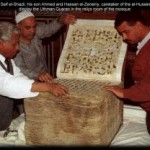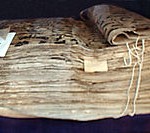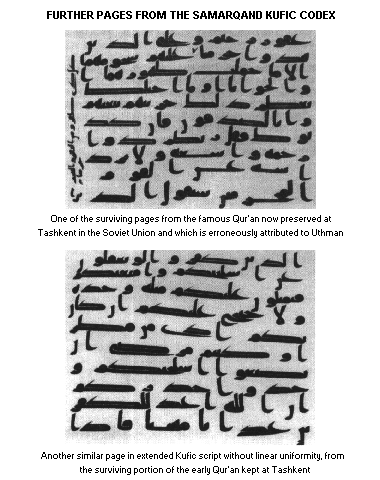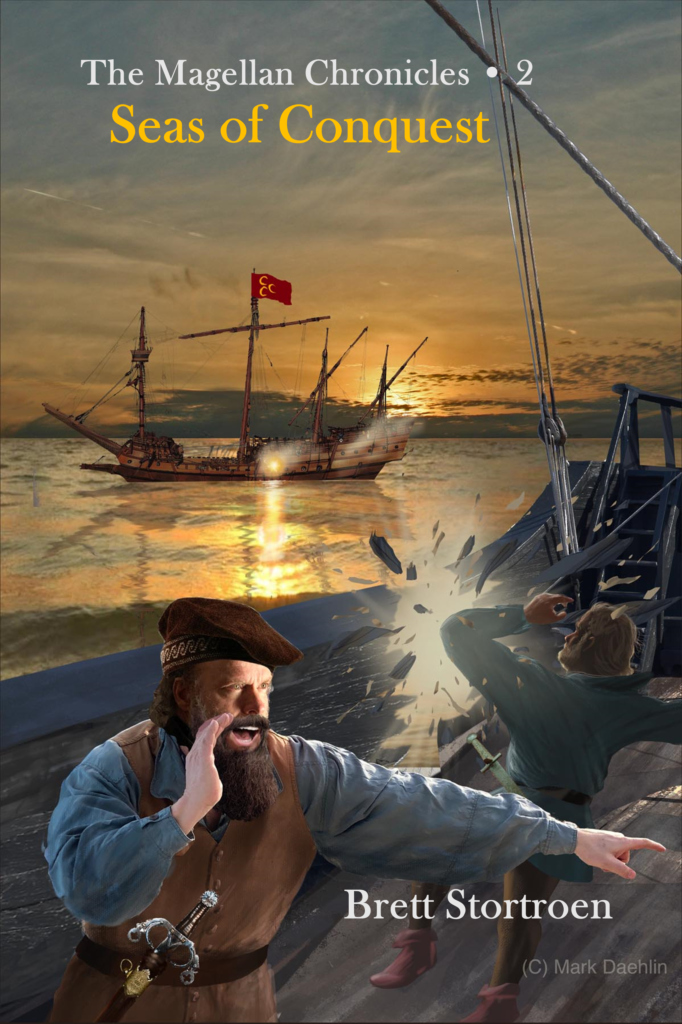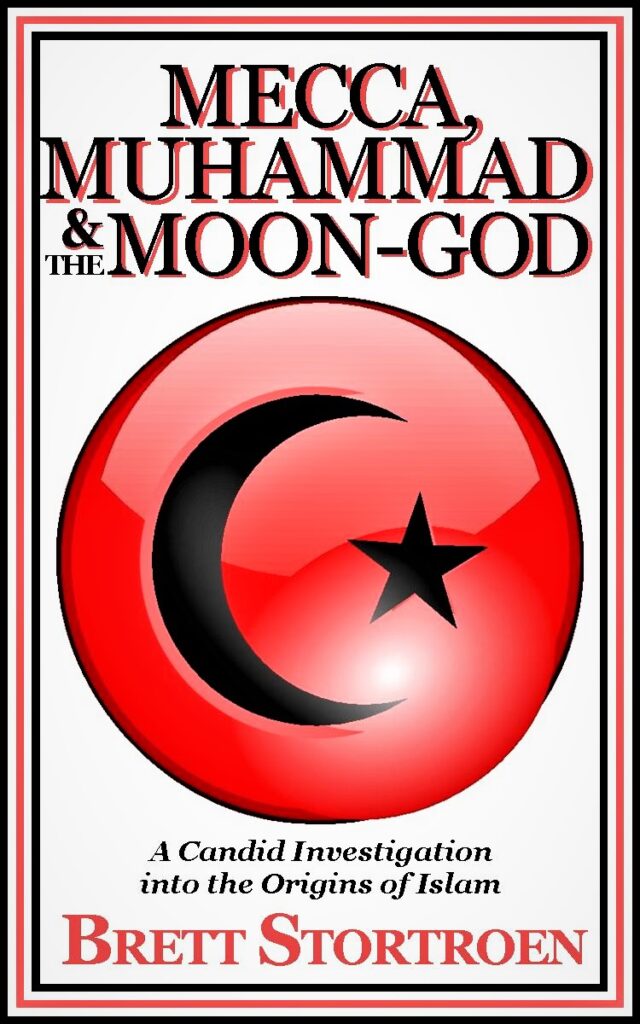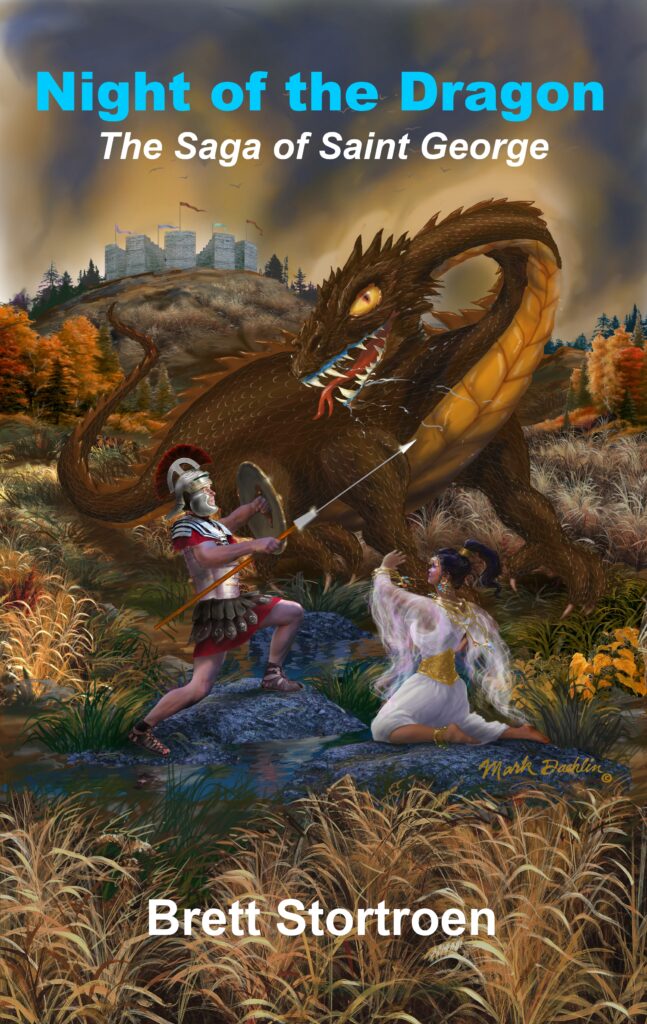Throughout the centuries and progressing into the twenty first century, Muslims will make outlandish claims regarding the origins of the Qur’an. Despite the lack of any credible historical evidence, these myths have been perpetuated for nearly thirteen hundred years. Now, the ebb tide has turned, with advanced textual studies the ancient myths surrounding the Qur’an’s origins will be dispelled.
THE COMPILATION OF THE QUR’AN
The Muslim Theory
According to popular Muslim ideology, the Qur’an had been perfectly transmitted from a “preserved tablet” in Paradise (Qur’an 85:22), to the prophet Muhammad, and down through the ages to today’s contemporary Qur’an. The Islamic orthodox position concerning the textual transmission states that on every occasion Muhammad had the revelations revealed to him, he had it written down. Subsequently, once a year the spirit Gabriel appeared to Muhammad to facilitate and collate the material previously revealed. Although the Qur’an had not been written out in book form at that period, not prior to the death of Muhammad, it was later compiled; all the suras were gathered in the correct order.
Next, the first caliph, Abu Bakr; ordered the first official recension. In the course of Uthman’s caliphate, various disquieting problems were seen in the text; so, Uthman established a committee, “then borrowed from Hafsa the copy made by Abu Bakr, and on its basis had a standard codex written out in the pure dialect of Quraish.”[1] Afterward, many copies were sent to the important centers of the Islamic kingdom. Consequently, all modern texts of the Qur’an had been exact reproductions of Uthman’s original, without any flaws or variation from the original, according to the orthodox Islamic beliefs.
The Scholar’s View
This Muslim position has been based on wishful thinking regarding the origin of the Qur’an. There is no evidence that Muhammad had formulated a written Qur’an. His messages were proclaimed orally. The prophet’s followers memorized the majority of the revelations. These individuals along with their successors were called Qurra (the reciters, later the readers).[2] The Hadith claimed that Zaid b. Thabit had been ordered on a mission to collect all the Qur’an into one book. The principle reason for this task was on account of the fact that many of the reciters were killed in the battle of Al-Yamama. Since these oral accounts were in the memories of these men, many of the Qur’an verses needed to be recorded that were in danger of being lost. The Hadith stated:
Zaid bin Thabit narrated: . . . Umar came to me and said: ‘A great number of reciters of the Holy Qur’an were killed on the day of the battle of Al-Yamama, and I am afraid that the casualties among the reciters of the Qur’an may increase on other battle-fields whereby a large part of the Qur’an may be lost. Therefore, I consider it advisable that your (Abu Bakr) should have the Qur’an collected.’[3]
From this historical evidence, one must conclude that there was initially no complete codified Qur’an, not even one at the time of Muhammad. If there were a complete text already in existence, there would have been no urgent need to collect any compiled materials or fragments in order to formulate a book. Another account from the Hadith states:
Zaid bin Thabit testifies that Abu Bakr called him to search for the fragmentary scripts of the Qur’an and to collect it (in one book). So I started looking for the Qur’an and collecting it from (what was written on) palm leaf stalks, white stones, and also from the men who knew it by heart, till I found the last verse. . . . Then the complete manuscripts of the Qur’an remained with Abu Bakr till he died then with Umar till the end of his life, and then with Hafsa, the daughter of Umar.[4]
Also, since the Qur’an verses were placed in notes, stones, shoulder bones, rib bones, pieces of leather, and small boards, it is quite obvious Muhammad neither compiled nor had in his possession a complete Qur’an Text.[5] If there were already a complete Qur’an Text at the time of Muhammad, there would be no need to search for all these fragments.
OTHER QUR’AN VERSIONS
The majority of Muslims will assume that the Qur’an translation of today is the exact replica of the original. The question remains regarding which of the so-called originals will ever be confirmed to be the correct one.
Throughout Arabia there existed many private and public versions. Interestingly, after Muhammad died, the only Muslims to have the entire Qur’an were Ansars. Not a single one of them were from the Quraysh tribe. Muhammad proclaimed the Qur’an was to be learned from four people, “generally given as: Ibn Mas’ud, Ubayy b. Ka’b, Salim, and Mu’adh b. Jabal.”[6] Two of these codices were very popular, those of Ibn Mas’ud and Ubayy b. Ka’b. Both of these Qur’anic versions varied from the Uthman Text. Arthur Jeffry in Materials for the History of the Text of the Qur’an commented on the diverse number of Qur’ans:
The people of Homs, and Damascus followed the codex of Miqdad b. al-Aswad, the Kufans that of Ibn Mas’ud, the Basrans that of Abu Musa al-Ash`ari, and the Syrians in general that of Ubai b. Ka`b (Ibn al-Athir, Kamil, III, 86). Here we have the beginning of Metropolitan Codices, each great center following that collection, or perhaps we may say that type of text, which had local fame.[7]
There were wide variations among the important regions of Medina, Mecca, Basra, Kufa, and Damascus. After it was compiled, Zayd’s Text was later concealed. After Umar died, it had been given to Hafsah for private keeping. It was not given publicity or official sanction. In Jam al-Qur’an, Gilchrist shed further doubt pertaining to Zayd’s Text:
At the time of its codification Zaid knew that his text could not be regarded as an absolutely perfect record as some passages were acknowledged as having been lost and the redactor himself overlooked at least two verses until he was reminded of them by Khuzaima. If Zaid and Abu Bakr were persuaded that his text was unquestionably authentic to the last word and letter, it would almost certainly have been given public prominence.[8]
In the course of Uthman’s caliphate, the other Qur’an versions had been established as normative in the various regions. Compiled by Zayd, Uthman’s Recension Text was hidden away in obscurity while the other texts were considered equally valid. During the caliphate of Uthman, controversy over these texts broke out; “The Muslim general Hudhayfah ibn-al-Yaman led an expedition into Northern Syria drawing his troops partly from Syria and partly from Iraq.”[9] As a result, the Muslims argued over which of the Qur’ans were to be used. Ibn Mas’ud’s Text remained standard for Muslims in Kufa, Iraq. Incidentally, the Hudhayfah became distraught over this and informed the caliph, Uthman.[10] The Hadith mentioned this account:
Huthaifa was afraid of the (people of Sha’m and of Iraq) differing in the recitation of the Qur’an, so he said to Uthman: O chief of the believers! Save this nation before they differ about the book (Qur’an) as Jews and Christians did before. So Uthman sent a message to Hafsa saying: Send us the manuscripts of the Qur’an so that we may complete the Qur’anic materials in perfect copies and return the manuscripts to you. . . . They did so and when they had written many copies . . . Uthman sent to every Muslim province one copy of what they had copied, and ordered all the other Qur’anic materials, whether written in fragmentary or whole copies, be burnt.[11]
Incredibly, Uthman burned entire copies of the Qur’an that were copied by Muhammad’s closest reciters. By solidifying a specific normative text for the Islamic kingdom, Uthman made a hasty move. Possibly in his haste, major portions of the real Qur’an were destroyed. By political and geographical popularity, the renderings from Medina were favored, despite the fact that Kufa had the superior recognition as the center of Qur’anic studies.[12] The above quoted hadith mentioned that the Jews and Christians had disputes on the text. This event was not very specific; perhaps, it had involvement with some of the heretical cults flourishing at the time, especially around Arabia.
Today, Islam’s ardent followers claim the differences in the various texts were only in the pronunciation of the Qur’an recitations. Since there were no vowel points used, this hypothesis is completely false in correlation to the beginning of the written texts. Therefore, in the written texts, no differences in recitation would have been evident. Hence, the question becomes apparent: Why did Uthman destroy all these manuscripts? The answer appears irrefutably simple; the texts themselves have had distinct variations. As a consequence, this provocation caused intense skepticism and doubt on the Qur’an’s preservation as being untainted throughout the ages.
Reaction to Uthman’s decree resulted in a complete outrage by the Islamic community. “The Ibadites made the charge against ‘Uthman that he had tampered with God’s word.’”[13] Gilchrist gives an example:
Abdullah ibn Mas’ud reacted very strongly to Uthman’s order and we are also informed that when Uthman enquired into the grievances among the Muslims who were rising in opposition to him, one of their complaints against him was his destruction of the other Qur’an codices, that he had “obliterated the book of Allah” (Ibn Abi Dawud, Kitab al-Masahif, p. 36). They significantly did not just say it was the Masahif (manuscripts), the usual word used for the Qur’an codices compiled before Uthman’s decree, but the Kitabullah, the “Scripture of Allah,” to emphasize their severe antagonism to his wanton extermination of such important manuscripts of the Qur’an.[14]
Definitely, the most outspoken critic of Uthman’s decree was Ibn Mas’ud. He had been one of Muhammad’s earliest disciples who learned the Qur’an directly from Muhammad and became regarded by Muhammad as the greatest scholar of the Qur’an. Zayd was not mentioned, but Ibn Mas’ud, Ubayy Ibn Ka’b, and others were highly praised by the prophet. Ibn Mas’ud refused to hand over his copy; when “the copy of Zaid’s text arrived for promulgation at Kufa as the standard text, the majority of Muslims there still adhered to Ibn Mas’ud’s text.”[15] Such a paradox appears to insinuate tampering and contamination of the text that even brought controversy among the original Islamic community.
Hafsa, one of Muhammad’s wives, kept another pre-Uthmanic Text. Marwan, the governor of Medina, demanded Hafsa surrender her text to him. Jeffrey described Marwan eliminated this text in the following account:
When she died Marwan assisted at her funeral and at its conclusion sent and with much insistence demanded the codex from `Abdallah b. Umar, Hafsa’s brother. Abdallah finally sent it to him and he had it destroyed, fearing, he said, that if it got abroad the variety of readings that Uthman desired to suppress would recommence.[16]
Then, Jeffrey commented:
This is a most unlikely story to have been invented and makes it quite clear that in the case of this codex we are in touch with a pre-Uthmanic text which differed, perhaps considerably, from that of Uthman.[17]
Again, it becomes apparently obvious that the Uthman Text was not the Hafsa Text that Mulsims claim to be official. All sorts of textual discrepancies are blatantly evident. How can any Muslim be certain that Uthman’s Text is the revealed words of Allah? Obviously, the text has been tampered with excessively.
All these variant texts around Arabia were either burned or hidden. Some survived to the present but are regarded as heretical by Islamic scholars. Arthur Jeffrey describes the level to which these manuscripts were suppressed:
An interesting modern example occurred during the last visit of the late Prof. Bergstrasser to Cairo. He was engaged in taking photographs for the archive and had photographed a number of the early codices in the Egyptian Library when I drew his attention to one in the Azhar Library that possessed certain curious features. He sought permission to photograph that also, but permission was refused and the codex withdrawn from access, as it was not consistent with orthodoxy to allow a western scholar to have knowledge of such a text.[18]
The extent of such suppression has been attributable to a lack of confidence in the transmission of the Qur’an. No Muslim can be certain of what material was actually in the original text. Uthman ordered corrections to be made in his text and therefore doubts remain concerning its reliability. He brought together four redactors to make revisions, amendments, and rewrite the text into the original Quraysh dialect. Once more, this reflects a change in the text itself, since any variations in pronunciation would not be seen in the actual text.[19] In view of the fact that no surviving manuscripts date back to Uthman’s time, no Muslim can even be certain that today’s text remains a replica of his compilation or is simply a revision text.
Repeatedly, Muslims will claim that Muhammad had a complete codified Qur’an. One will find evidence to the contrary; the Qur’an is disjointed, fragmentary, and historical dating is completely mixed up in reference to creation events and personages depicted in the biblical accounts. Clearly, this will support the premise, in alliance with textual criticism, that the Qur’an has chronological problems pertaining to events and characters mentioned within the earlier dated Dead Sea Scrolls and Tanach.
Zayd collected the fragments of the Qur’an verses. Later, under Uthman, the redactors edited the verses to form a revised Qur’an. Perhaps, more tampering with the text had taken place after Uthman. Though there had been no manuscript evidence to prove otherwise, the Muslims are faced with a dilemma. Apparently, Muhammad’s revelations were erroneous, or the men who compiled the text of the Qur’an also corrupted it.
All these facts indicate and point to textual tampering. With the burning and suppression of other equally valid texts, it becomes easy to doubt the authenticity of the text. Concerning the Qur’an’s accuracy, it remains a question of blind faith versus forensic facts. The evidence clearly points to the contamination of the Qur’an text.
THE EARLY MANUSCRIPTS OF THE QUR’AN
Often, the Muslim scholars claim there are two ancient manuscripts of the Qur’an, which are supposed to be Uthman’s original text. Western scholars have challenged this hypothesis. In order to determine the precise date of a manuscript, an analysis of the script must be done. Before Islam came into existence, the only script proven to exist had been the Jazm script. No Qur’an texts from this period are known to exist. To be precise, no large fragments or complete codices have been known to exist “earlier than the late eighth century (about one hundred years after Muhammad’s death).”[20] Most of the earliest extant manuscripts are written in the Kufic script. This script originates from “Kufa in Iraq, where Ibn Mas’ud’s codex had been highly prized until Uthman ordered its destruction.”[21] Furthermore, before the ninth century, one must realize that the Kufic script Qur’an was not known to exist in either Mecca or Medina. Absolutely none had come from either area; furthermore, there is not even a thread of recorded evidence for verification!
Consistently, Muslims have claimed two specific manuscripts were found which were Uthman originals. As mentioned before, the Uthman Text was basically Hafsa’s Codex; yet Marwan destroyed that text. Rejecting historical details opposing their dogmatic blindness to the truth, Muslims still cling to the belief that original manuscripts still survived.
Moreover, fanciful accounts surrounded the Topkapi and Samarqand Codices. From the past to the present, many have attested that these manuscripts were actually Uthman’s. They claim that, at the time of his murder, he was reading the Qur’an and the preserved pages are still covered with his blood.
The Samarqand Codices are preserved . . . in the Soviet State Library at Tashkent in Uzbekistan in Southern Russia.[22] Gilchrist describes this codex:
It is clearly written in Kufic script and, as we have seen, it is asking too much of an objective scholar to believe that a Qur’an manuscript written at Medina as early as the caliphate of Uthman could ever have been written in this script. Medinan Qur’ans were written in the al-Ma’il and Mashq scripts for many decades before the Kufic script became the common denominator of all the early texts throughout the Muslim world, and, in any event, Kufic only came into regular use at Kufa and elsewhere in the Iraqi province in the generations following Uthman’s demise.[23]
Another manuscript is being displayed at the Topkapi Museum in Istanbul, Turkey. Like the Samarqand, the Topkapi Codex has been claimed to be an Uthman original. Again, the problem of the script written in Kufic style becomes contradictory. In addition, this codex has “ornamental medallions with occasional ornamentation between the Suras,” which indicates an older date.[24]
Equally, these manuscripts, the Samarqand and Topkapi, are said to have bloodstains on them. If both texts were Uthman’s, he must have been reading both at the time of his death, which is quite improbable according to traditional teachings that mention only one book. However, the most glaring problem lies in the script style; Uthman’s Text would not have used the later Kufic style. Outrageous beliefs such as these demonstrate how far the Muslim community will go to prove the accuracy of the Qur’an. These lies may be parleyed off to the ignorant but not to scholars of history. From the evidence, no surviving Qur’an text dates earlier than one hundred years after Muhammad’s death. An enormous gap of time exists between Muhammad and the earliest extant Qur’an. With these facts exposed, the tenacious claim by Muslims for the perfect transmission of the Qur’an, again, becomes a matter of blind faith and not based on historical documentation.
THE DOCTRINE OF ABROGATION
Muhammad’s moon-god, Allah, declared abrogation of revelations an acceptable practice. Qur’an 2:106 states:
Such of Our revelations as We abrogate or cause to be forgotten, We bring (in place) one better or the like thereof. Knowest thou not that Allah is able to do all things?
This sura completely contradicts Qur’an 85:22, which declared the Qur’an to have been written on a “preserved tablet” in heaven.
The Muslims believe Allah is an omniscient being, all knowing in regard to all human events. However, Allah could not predict the future based upon the Qur’anic declarations. Why would an all-knowing deity need to constantly abrogate (change) his original messages? Allah therefore, emphatically, cannot be the deity of the biblical patriarchs. Yahveh knows the future as well as fulfills prophecies. When Yahveh came as a man, Jesus (Yahsu) declared in regard to his word:
Do not think that I came to destroy the law or the prophets. I did not come to destroy but to fulfill. For assuredly, I say to you, till heaven and earth pass away, one jot or tittle will by no means pass from the law till all is fulfilled” (Matt. 5:17-18).
In the case of Muhammad, one notices a stark contrast concerning the word of God. It remains apparent that Muhammad dictated the revelations and not Allah. Albeit, his close followers, and those to whom he had been in contact, were at times skeptical of his messages. The Qur’an is satiated with verses showing the resistance to his prophethood. Qur’an 25:4-5 states:
Those who disbelieve say: This is naught but a lie that he hath invented, and other folk have helped him with it, so that they have produced a slander and a lie. And they say: Fables of the men of old which he hath had written down so that they are dictated to him morn and evening.
This passage puts Muhammad to the test. The question remains in the twilight of history to deliberate fiction from truth. Was Muhammad a true prophet? If so, why did he have to constantly change his messages? As mentioned in chapter four, Muhammad, who was continually under pressure and reprimanded by his peers for worshipping the three goddesses, changes his revelation message. He simply declares this practice of polytheism unlawful and avoids any confrontation. However, he must now explain how Allah has suddenly changed his mind again. Again, the fingerprints of Muhammad are evident all over the Qur’an.
With the proper study of the Islamic texts, a vast number of abrogated verses have been discovered. Pertaining to the fast of Ramadan, Muhammad abrogates a verse with reference to not approaching women during this particular time frame. This verse becomes a problematic dilemma for Muhammad due to his follower’s disobedience to this injunction. Muhammad cannot afford to punish them for fear of the repercussions and thus modifies the prior revelation by a new one:
It is made lawful for you to go unto your wives on the night of the fast . . . Allah is aware that ye were deceiving yourselves . . . so hold intercourse with them and seek that which Allah hath ordained for you (Qur’an 2:187).
Conveniently, Muhammad changes the Qur’an to suit the particular occasion to meet his needs. Often, when dealing with his own affairs, he would apply the abrogation technique. Once, while Muhammad’s wife Hafsa was gone, it was mentioned that he brought Mary, the Copt—from the Coptic Christianity of Africa—to the house of his wife. Hafsa was perturbed, so Muhammad tried to appease her by saying, “‘Keep my secret, and I will consider Mary the Copt unlawful to me!’”[25] Hafsa told Aisha, Muhammad’s child bride, which aroused so much anger that Muhammad divorced Hafsa. Later, Muhammad changed his mind and Allah conveniently declared:
O prophet! Why bannest thou that which Allah hath made lawful for thee, seeking to please thy wives? And Allah is forgiving, merciful. Allah hath made lawful for you absolution from your oaths, and Allah is your protector. He is the knower, the wise (Qur’an 66:1-2).
After Muhammad’s anger subsided, he abrogated the previous verses. He resumed sexual relations with Mary and even remarried Hafsa.[26] These were merely a few sample passages demonstrating how Muhammad employed the practice of abrogation. His ‘fingerprints’ of coercions are all over the Qur’an. To believe that these former injunctions, now replaced by new opposite revelations, were divinely inspired messages from Allah seems ludicrous to the rational individual.
There are numerous passages questioning whether the revelations were from Allah or Muhammad. For instance, why would Allah be so concerned about trivial matters of the prophet’s daily squabbles? Qur’an 33:53 states:
Enter not the dwellings of the prophet for a meal without waiting for the proper time, unless permission be granted you. But if ye are invited, enter, and, when your meal is ended, then disperse. Linger not for conversation. Lo! That would cause annoyance to the prophet, and he would be shy of (asking) you (to go).
One may find difficulty to believe that Allah uttered these verses; it seems more probable that Muhammad said them.
Further evidence that questions the divine authorship of the Qur’an may be seen in Sura 1:
Praise be to Allah, Lord of the worlds, the Beneficent, the Merciful. Owner of the day of judgment, Thee (alone) we worship; Thee (alone) we ask for help. Show us the straight path (Qur’an 1:1).
Interestingly, casting further doubt on Uthman’s version, Ibn Mas’ud does not include this passage in his Qur’an. If this was Allah speaking, why does it sound like a prayer to Allah? Again, in Qur’an 27:91-92, Allah could not be speaking: “I am commanded only to serve the Lord of this land which he hath hallowed, and unto whom all things belong. And I am commanded to be of those who surrender.” If Allah was speaking, then Allah seems to be worshipping himself or another god. Likewise, Suras 112 and 113 are obvious prayers to Allah. Frequently, the Muslim translators insert the word “say” in front of the passage, but this too, would seem to be an abrogation to the original Arabic. As a result, the Muslims are altering their own sacred texts to facilitate a cover up of the original intended meaning of the text. The Qur’an cannot be the words of Allah based upon these examples.
In formulating falsified material that would compose the Qur’an, there exists further evidence to buttress the theory that Muhammad was the sole source of inspiration in conjunction with his demonic spirit guide. By rejecting Muhammad as a biblical prophet, the Jews often pressured Muhammad. Consequently, Muhammad changed his religious practices and dogma. Originally, he followed the Yom Kippur fast of the Jews, but changed it to the Ramadan fast with all its pagan overtones. Similarly, he changed the direction of prayer from Jerusalem to Mecca.
To the contrary, the biblical prophets of the Holy Tanach would have never succumbed to pressure from others, no matter what the cost, even if it meant laying down their lives as martyrs. On the other hand, Muhammad fabricated and revised his religion day by day; when under extreme pressure, he would repeatedly redact his religion by the principle of abrogation.
THE SOURCE OF THE QUR’AN
Muhammad’s Qur’an was virtually a blend of many religions. In Mecca, as a child, he learned the pagan religions of the Kabah, which included approximately 360-plus gods for every day of the year, based primarily on astrological rites. The principle deity was, of course, the moon-god, Allah. Along with these cults, he was exposed to others while he traveled the caravan route around Arabia: 1) Legends from the Arabs, 2) Jewish myths from the Talmud, 3) Midrash, and apocryphal works, 4) Sabean traditions, 5) Zoroastrianism, 6) Hinduism, and 7) Christian heretical sects.
One of these Christian heretical sects, Ebionism, possibly played a major role in Muhammad’s spiritual development. His first wife, Khadija, had a cousin named Waraqa Ibn Nauwfal “who was the Ebionite Christian bishop of Mecca.”[27] The Ebionites denied the deity of Jesus (Yahsu), the Messiah, just as Muhammad taught later. From a young boy, Muhammad was indoctrinated with false teachings from numerous sources. His early mystic experiences with his familiar spirit, feigned as Gabriel in the cave, infiltrated his conscience with dark influences; while Waraqa, the Ebionite bishop, filled his young mind with further errant dogma. The Hadith verified that Waraqa was familiar with the scriptures:
Waraqa bin Naufa . . . who, during the PreIslamic Period became a Christian and used to write with Hebrew letters. He used to write the gospel, the Hebrew as much as Allah wished him to write.[28]
Waraqa taught Muhammad a distorted version of the Holy Bible, which appears quite evident as one compares the original biblical accounts and historicity with the scrambled stories in the Qur’an, which are absurdly mixed up chronologically. Assessments of numerous Bible accounts reveal the twisted and perverted Qur’an renditions. Had Muhammad’s Qur’an been delivered by the real angel, Gabriel, the biblical stories and characters would not have been distorted, placed in the wrong chronological order, abrogated constantly, nor filled with historical deficiency.
From Chapter 7 of Mecca, Muhammad & the Origins of Islam: A Candid Investigation Into the Origins of Islam.
[1] Arthur Jeffrey, Materials for the History of the Text of the Qur’an: The Old Codices (Leiden: E.J. Brill, 1937), 5.
[2] Ibid., 6.
[3] al-Boukhari, Hadith, vol. 9, no. 7191:119-20.
[4] al-Boukhari, Hadith, vol. 6, no. 4986:279-80.
[5] Newmann, Muhammad, Islam and the Qur’an (Hatfield, PA: Interdisciplinary Biblical Research Institute, 1996), 6.
[6] Ibid., 312.
[7] Jeffrey, Materials, 7-8.
[8] Jeffrey Gilchrist, Jam’ al-Qur’an: The Codification of the Qur’an Text, [http://www.answering-islam.org/Gilchrist/Jam/index.html] (accessed February, 2012).
[9] Ibid. [10] Ibid.
[11] al-Boukhari, Hadith, vol. 6, no. 4987:280.
[12] Jeffrey, Materials, 8.
[13] Ibid.
[14] Gilchrist, Jam’ al-Qur’an, chap. 2:2.
[15] Ibid., chap 3:2.
[16] Jeffrey, Materials, 213.
[17] Ibid.
[18] Ibid., 10.
[19] Gilchrist, Jam’ al-Qur’an, chap. 2:7.
[20] Ibid., chap. 7:2. [21] Ibid. [22] Ibid., chap 7:5. [23] Ibid., chap. 7:5. [24] Ibid.
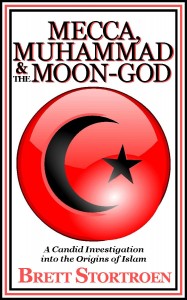
Related Links:
http://www.message4muslims.org.uk/the-quran/form-arrangement-of-the-koran/the-original-quran/

